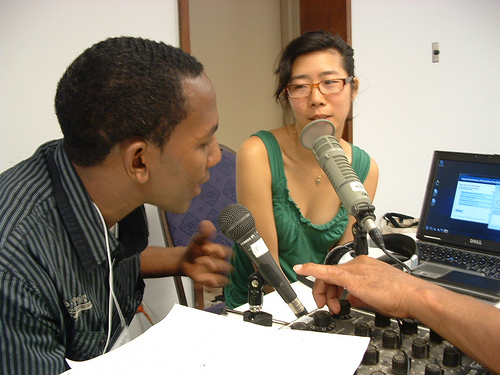Our Campaign for Local Programming on LPFM
 Summer 2012 Upate: The FCC comment period is over, so the links to file comments below are no longer active. This page remains up as a resource. We will post updates on the FCC rules when they are available.
Summer 2012 Upate: The FCC comment period is over, so the links to file comments below are no longer active. This page remains up as a resource. We will post updates on the FCC rules when they are available.
In March 2012, the FCC asked the public to comment on several ideas for new rules related to local programming for community radio. The most important proposal would create a local programming requirement for new Low Power FM (LPFM) stations. Write the FCC below to support local programming on community radio!
LPFM was created to give communities a voice on the airwaves. The FCC only licenses LPFM stations to locally based non-profit organizations or local governments, with only one per customer (no giant networks allowed). Yet until now, there has never been a requirement for LPFM stations to play any local programming. A new requirement would probably require stations to broadcast a minimum amount (for example 20 or 40 hours) of local programming each week. Most community stations can easily meet such a requirement already.
Why is local programming so important now, after more than a decade? First, competition for new LPFM licenses will be fierce. Right now, LPFM hopefuls who commit to producing eight hours of local programming each day get an extra credit "point" on their applications, giving them an edge against competitors. And the FCC has proposed an additional point for local programming. But even with two points, a local group ready to serve their community with local programming could still lose to a station with canned network programming 24/7.
Second, we have plenty of nationally syndicated media today. What we don't have is localism. In the consolidated landscape of commercial radio, giant networks control hundreds of stations, repeating the same playlists and talk shows across the country. We can get global news and information on the Internet. But with struggling newspapers and less news on local television and radio, we don't have many sources of information about our own backyards. We can't get news about our neighbors, music from local artists, or information we need to participate in local democracy.
Local programming is the heart of community radio -- from city elections to high school sports to emergency response. As our cities and towns face tough problems, community radio can be a forum for the community debate, dialogue, and solutions missing from other media. We need local programming on LPFM more than ever.
Use the form below to write the FCC and tell them that local programming matters!
(Are you a musician? Check out our Musicians Campaign for Local Programming.)
